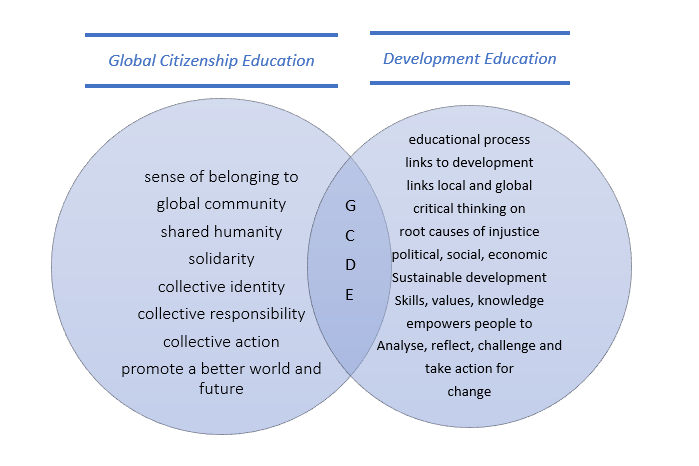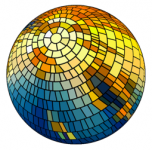Terminology Used by Praxis
There are differences between the academic and activist tradition that is ‘Development Education’ and that of ‘Global Citizenship Education’, the former linking more with theories of development and the latter linking more with ideas of citizenship.
The Praxis Project considers it important to retain the term Development Education in order to honour the rich tradition in Ireland of practitioners, government bodies, activists and academics who have defined, imagined and reimagined this deep philosophical, participatory, action-led and practical approach to pedagogy and active citizenship with a focus on development, justice and human rights. Likewise, the term Global Citizenship, links intrinsically with Development Education, but draws too on the rich heritage and discourse of ideas of citizenship that can be traced back to at least ancient Greece if not before. The Praxis Project therefore uses the term Global Citizenship and Development Education to bring these two academic strands together, thus connecting and honouring both traditions.
While many might argue that the terminology is not important and that it is a distraction from the work itself, we believe that as GCDE develops as an academic discipline, we need clarity on what we mean by GCDE, we need to understand why we use particular terminology and what are the nuanced differences between the different terms. These approaches to education do indeed have much in common, we must work together with activists, academics and educationalists who share values and goals. However, we also want to ensure that we do not lose the essence of what GCDE is as an academic discipline and particularly not lose the strong Development Education activist traditions on which we stand.
Below is a graphic representation of GCDE.

Definitions
Definitions of Development Education (DE) in Ireland can be found in the work of statutory agencies such as Irish Aid, NDGOs such as Trócaire, The Irish Development Education Association (IDEA), Dóchas, Concern, Oxfam, GOAL or ‘80:20’ and in academic discourse. Some examples are as follows:
Irish Aid’s (2017: 6) current strategic plan defines DE as follows:
Development Education is a lifelong educational process which aims to increase public awareness and understanding of the rapidly changing, interdependent and unequal world in which we live. By challenging stereotypes and encouraging independent thinking, Development Education helps people to critically explore how global justice issues interlink with their everyday lives. Informed and engaged citizens are best placed to address complex social, economic and environmental issues linked to development. Development Education empowers people to analyse, reflect on and challenge at a local and global level, the root causes and consequences of global hunger, poverty, injustice, inequality and climate change; presenting multiple perspectives on global justice issues” (Irish Aid’s, 2017: 6).
In addition, Irish Aid is now using the term Global Citizenship Education (GCE) as an umbrella terms to include DE and Education for Sustainable Development (ESD) (Irish Aid, 2017: 9).
The 2015 GENE[1] report uses the term ‘Global Education’ (GE) as the umbrella term (GENE, 2015: 13):
Global Education is education that opens people’s eyes and minds to the realities of the world and awakens them to bring about a world of greater justice, equity and human rights for all. GE is understood to encompass Development Education, Human Rights Education, Education for Sustainability, Education for Peace and Conflict Prevention and Intercultural Education; being the global dimensions of Education for Citizenship.
The 2019 GENE Report (GENE, 2019: 26) describes the essence of ‘Global Education’ as:
Values such as a focus on global justice, on economic development and equality, on solidarity, on the relationship between local and global dimensions of justice, on action for greater human rights for all, and on planetary sustainability are not neglected, as they sometimes can be; so that, building on whatever tradition is strong or in vogue in a particular country, there can nevertheless be “sine qua nons”, bottom lines, quality criteria, and movement in the direction of greater integration of core concepts, non-negotiables and GE values.
At a United Nations (UN) level Goal 4.7 of the Sustainable Development Goals focuses on ‘global citizenship’. Goal 4.7 aims to ensure, by 2030, that:
“all learners acquire the knowledge and skills needed to promote sustainable development, including, among others, through education for sustainable development and sustainable lifestyles, human rights, gender equality, promotion of a culture of peace and non-violence, global citizenship and appreciation of cultural diversity and of culture’s contribution to sustainable development.”
The Irish Development Education Association (IDEA) (2021: 9) defines Development Education as follows:
Development Education enables people to understand the world around them and to act to transform it. It works to tackle the root causes of injustice and inequality, globally and locally, to create a more just and sustainable future for everyone.
IDEA uses Development Education as a term that includes Global Citizenship Education, Education for Sustainable Development, and related terms.
In Ireland, DE is also being increasingly situated within an Education for Sustainable Development (ESD) frame. For instance, Irish Aid’s DE Strategy 2017-2023 (Irish Aid, 2017: 6) links DE to the Sustainable Education Strategy for Ireland (DES, 2014: 3). It is interesting to note the different emphasis in this definition, from earlier definitions such as in the first Irish Aid (then Development Cooperation Ireland) strategic plan (DCI, 2003: 11). The current definition places emphasis on “environmental” and “climate justice”, and the word “political (structures)” has been removed from the earlier 2003 definition. The Praxis Project is clear that the term ‘political’ is essential in any definition of its work.
Having explored these many definitions, Daly, Regan and Regan (2015: 1) draw together a useful description which incorporates the various attributes of GCDE. The Praxis Project aligns strongly with this description:
- Focuses directly on key development and human rights issues locally and internationally;
- Seeks to stimulate, inform and raise awareness of issues from a justice and/or rights perspective;
- Routinely links local and global issues;
- Explores key dimensions such as individual and public dispositions and values; ideas and understandings, capabilities and skills;
- Critically engages with the causes and effects of poverty and injustice;
- Encourages public enquiry, discussion, debate and judgement of key issues;
- Encourages, supports and informs action-orientated activities and reflection in support of greater justice;
- Takes significant account of educational theory and practice;
- Emphasises critical thinking and self-directed action;
- Seeks to promote experiential learning and participative methodologies;
- Routinely challenges assumptions by engaging with multiple, diverse and contested perspectives.
[1] Global Education Network Europe (GENE) is the European network of Ministries and Agencies with national responsibility for policymaking, funding and support in the field of Global Education.
